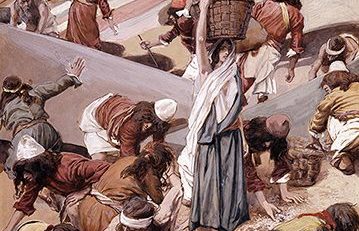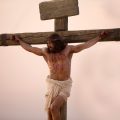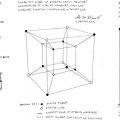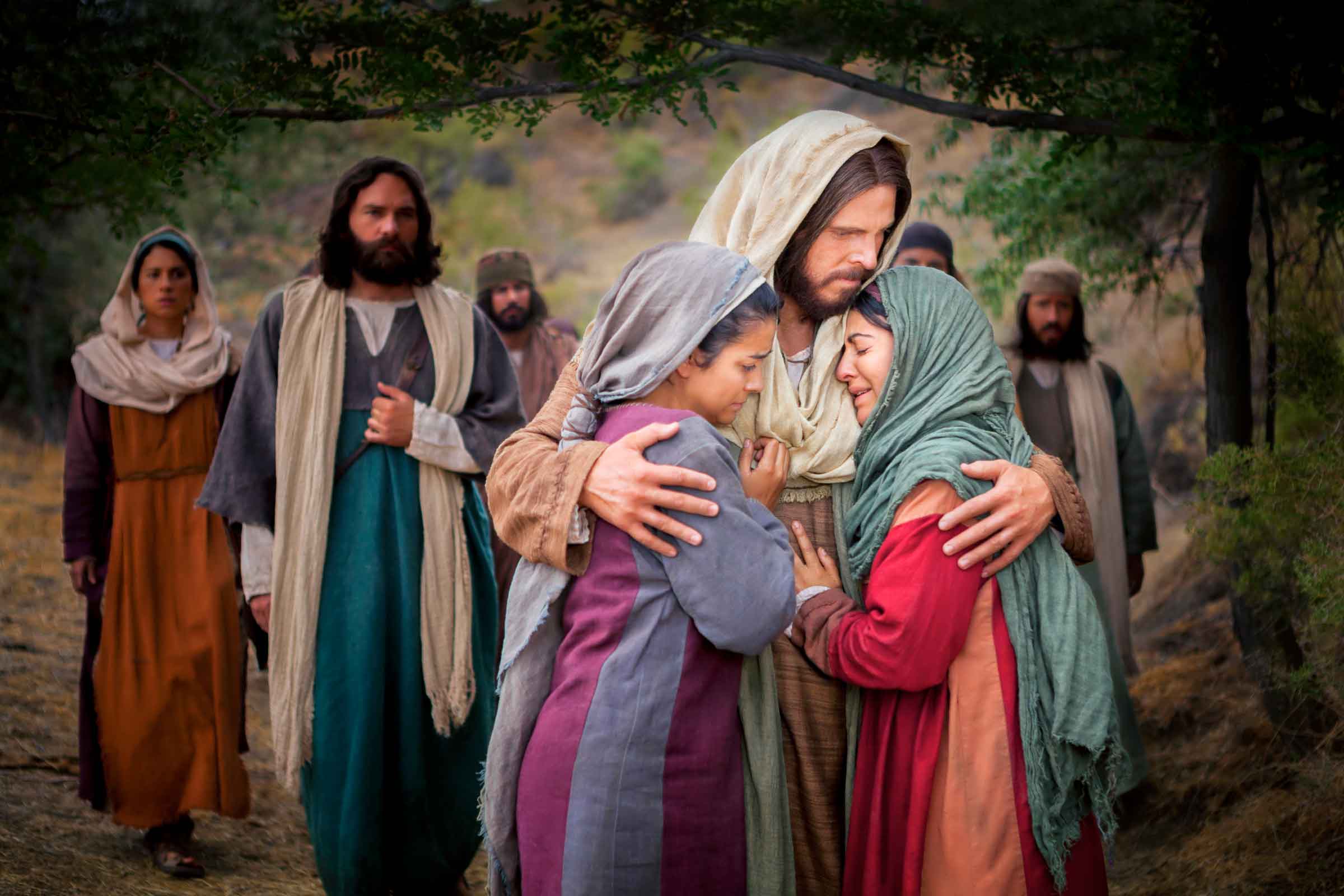I teach Valient 8 in the Primary, the Sunday School Education System for Children of the Church of Jesus Christ of Latter-day Saints. I plan to testify of Jesus Christ in each lesson. It has been my theme; although, I am teaching Old Testament content. The Old Testament almost never speaks of him directly as everything testifies of him. Jehovah is the premortal name of Jesus Christ. I hope that this article brings some clarity to how the Old Testament testifies of Christ; although, it does not mention the word “Christ” in the literature. Nephi wrote: “… all things which have been given of God … unto man, are the typifying of him.” (2 Ne. 11:14).
I related several doctrines in my lesson to teach a revelation that I had recently. I like to customize my lessons, following the purpose and the content of the manual, but I don’t necessarily follow the suggestions of the manual.
The lesson was a Sabbath Day Lesson because the Israelites lived off manna for forty years as the journeyed. I didn’t just want to teach a Sabbath day lesson without relating it to bread, since I had that revelation. I used the following scriptures in the lesson:
“And they took their journey from Elim, and all the congregation of the children of Israel came unto the wilderness of Sin, which is between Elim and Sinai, on the fifteenth day of the second month after their departing out of the land of Egypt. And the whole congregation of the children of Israel murmured against Moses and Aaron in the wilderness: And the children of Israel said unto them, Would to God we had died by the hand of the Lord in the land of Egypt, when we sat by the flesh pots, and when we did eat bread to the full; for ye have brought us forth into this wilderness, to kill this whole assembly with hunger. ¶ Then said the Lord unto Moses, Behold, I will rain bread from heaven for you; and the people shall go out and gather a certain rate every day, that I may prove them, whether they will walk in my law, or no. And it shall come to pass, that on the sixth day they shall prepare that which they bring in; and it shall be twice as much as they gather daily.” (Exodus 16:1-5)
Why did God have the Israelites gather double the food on the sixth day? They collected a second day’s worth of food to observe the Sabbath more fully on the seventh day.
The following paragraphs will address the several doctrines related to manna and bread and how it applies today: Bread of Life, Covenants, Sacrament, Holy Ghost, and Eternal Life. Before I start on that I am going to insert the definition of Manna from the Bible Dictionary, so people will more fully understand what I am talking about.
“It is impossible to find any natural product that will answer to the requirements of the scriptural narrative in regard to this heavensent food. With regard to the name, we are told (Ex. 16:15) that the people, seeing the small scale-like substance, said one to another, “Man-hu,” “For they wist not what it was.” This also translates “What is it?” See Ex. 16:31–35; Num. 11:7–9; Josh. 5:12; John 6:31–32; 1 Cor. 10:1–4; Heb. 9:4; Rev. 2:17.” (The entry for Manna in the Bible Dictionary of the standard works of the Church of Jesus Christ of Latter-day Saints cannon scripture)
Bread of Life
Jesus Christ is the bread of life because his atoning sacrifice provides the means for everlasting life as the manna sustained the life of the Israelites during their journey. John the Beloved quoted Christ in the sixth chapter of an epistle of his, writing the following segment:
“Our fathers did eat manna in the desert; as it is written, He gave them bread from heaven to eat. 32 Then Jesus said unto them, Verily, verily, I say unto you, Moses gave you not that bread from heaven; but my Father giveth you the true bread from heaven. 33 For the bread of God is he which cometh down from heaven, and giveth life unto the world. 34 Then said they unto him, Lord, evermore give us this bread. 35 And Jesus said unto them, I am the bread of life: he that cometh to me shall never hunger; and he that believeth on me shall never thirst. (John 6:31-35).
How is Jesus the Bread of Life? As man would die physically without food so would man die spiritually without Jesus Christ’s atonement. In order to be given eternal life, one must repent after obtaining faith on him by revelation; then, man must join his people by taking upon them the covenant of baptism.
Covenant
A covenant is a binding promise with God, where we promise obedience to his commands, in order to be given eternal life. The Israelites depended on Heavenly Father for daily manna to sustain them temporally; however, the bread of the sacrament ordinance sustains our covenants, renewing them weekly. Exodus 31 verse 16 expresses “Wherefore the children of Israel shall keep the sabbath, to observe the sabbath throughout their generations, for a perpetual covenant.” Perpetual means never ending or changing, and the Sacrament is a perpetual covenant.
The Sacrament
The bread in the sacrament or communion is symbolic of Jesus Christ’s torn flesh, reminding us of him. This deep symbology is awesome. Joseph Smith’s translation of John 26:22 is “And as they were eating, Jesus took bread and brake it, and blessed it, and gave to his disciples, and said, Take, eat; this is in remembrance of my body which I give a ransom for you.” Ransom means “a sum of money or other payment demanded or paid for the release of a prisoner.” Every man were all held captive by Satan until Jesus broke the bands of death. Another promise in the sacramental prayers is “that they may always have his Spirit to be with them.”
Holy Ghost
Bread and food are filling, and the Holy Ghost fills us with joy, comfort, and love. One thing that I pointed out in my lesson is that people feel empty without the gift of the Holy Ghost. Its duty to testify and teach us truth is fulfilling too. We feel whole when we learn and apply the fullness of the Gospel. The gift of Holy Ghost is the second part of the baptismal covenant called “Confirmation,” where people are given the Holy Ghost. The following scripture was planned to be read in my lesson: “And he said unto them: He that eateth this bread eateth of my body to his soul; and he that drinketh of this wine drinketh of my blood to his soul; and his soul shall never hunger nor thirst, but shall be filled.” (3 Nephi 20:8)
Eternal Life
Eternal Life is the final doctrine that I addressed because it is the purpose of everything, reading the following scripture in John chapter 6 verse 27: “Labour not for the meat which perisheth, but for that meat which endureth unto everlasting life, which the Son of man shall give unto you: for him hath God the Father sealed.” The promise of the covenant is eternal life, if we endure to the end, living the restored gospel of Christ. We ought to labor for the bread of life that sustains us for eternity rather than food that sustains man for a few hours. Eternal Life is an eternal family. We spoke about the work of the millennium to perform the ordinance work that all mankind will be part of covenant people in temples. The fruits of each family can be eternal with an eternal posterity. Is this not eternal joy?
I hope that this article is a testimony that God does exist and that he communicates to man. This communication is called revelation. Faith in Christ is based on revelation, a knowledge of him. God has given many revelations as this article is an explanation of one. If you don’t believe that the Gospel of Jesus Christ is the true way to happiness with God and family for mortality and immortality, please receive this plea. Read the Book of Mormon from the very first page to the last chapter. This book is the Keystone of the Church of Jesus Christ of Latter-day Saints, holding the arch of the entrance to the kingdom strong and together. The Church of Jesus Christ of Latter-day Saints is the kingdom of God restored on Earth. As you read the Book of Mormon, heed to the words therein especially the last chapter’s invitation to pray.
Latest posts by Alexander Hicken (see all)
- The Symbolism of Manna and Bread - July 2, 2018





